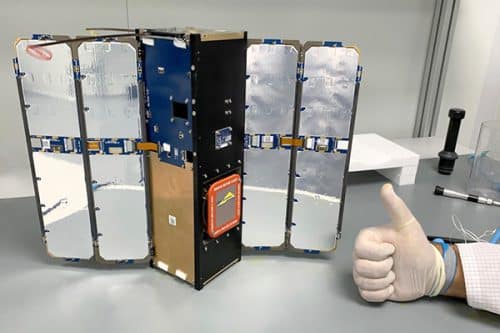The satellite is the first of a constellation of nano-satellites that will enable the provision of reliable communication services in areas with limited satellite coverage or no coverage at all * Yoram Shmoli, CEO of the Aviation and Space Division of Elbit Systems: "Such services are required for a variety of commercial applications that include search and rescue operations, communication Emergencies from remote areas, logistics management of fleets as well as tracking and sensing from machine to machine for a wide variety of needs"

Elbit Systems announced yesterday (18/12/19) that the company's nanosatellite NANOVA was successfully launched into space. NANOVA was developed in collaboration with an American company as part of the BIRD Foundation initiative and is planned to be part of a constellation of nano satellites for commercial purposes. NANOVA will be operated from a ground control station established at the company's site in Haifa.
The nano satellite NANOVA was launched from the Stish Dhawan Space Center in southern India, on a dedicated launcher for polar orbit. NANOVA went into orbit 18 minutes after launch at an altitude of 580 km.
The size of NANOVA is 3U (10*10*30), and its weight is 5 kg. It carries a UHF frequency transmitter and receiver for relaying data, voice and text communications.
Yoram Shmoli, CEO of the aerospace division of Elbit Systems, said: "We are proud to start operations in the field of the nanosatellite constellation. We plan to continue investing in this developing field, expanding our sensing capabilities and the variety of potential applications."
"Elbit Systems' decades-long experience in designing, manufacturing and deploying electrostatic systems in space, space equipment and satellite communication with its leadership in the field of avionics, autonomous systems and artificial intelligence, provide the company with a unique technological basis to provide an end-to-end satellite constellation solution."
"NANOVA, designed to meet stringent performance and cost requirements, combines proven and hardened off-the-shelf components, and a sophisticated interface and analysis tools. According to Shmoly, these make NANOVA an attractive solution for reliable communication services in areas with limited or no satellite coverage. "Such services are required for a variety of commercial applications that include search and rescue operations, emergency communications from remote areas, fleet logistics management as well as machine-to-machine tracking and sensing for a wide variety of needs."
More of the topic in Hayadan:

One response
In this context, it is worth mentioning Starlink, which has already launched 122 satellites with a very similar mission.